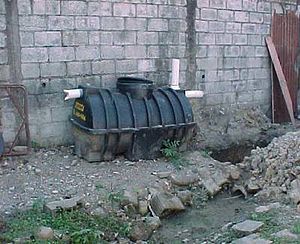 Image by Axel Bührmann via Flickr
Image by Axel Bührmann via FlickrI told them, politely, that this stretch of water was private property, to which they responded by telling me that it was not and that we English might think we owned the place, but we had to obey the law like anyone else.
There is only one thing to do with brash young ignoramusses like that...and it is not to show them your deeds.
I sent the dog after them.
They were laughing and jeering as they paddled deliberately among the waterfowl and their chicks, pointing at the dog running along the bank.
When the dog plunged into the water, they were still laughing and jeering, but changed their tune rapidly as he clambered aboard the kayak. Lashing out at him with paddles was a disastrous failure....it served only to annoy him....so the only other option was ignominious flight.
How French.
I called the dog off once they had clearly got the message and he came swimming back, job well done, to give me a free shower.
How canine.
From a point of safety, well down the bank, one of the yobs shouted that I would be sorry.
He would denounce me.
How French.
What would be the object of the denunciation? It might surprise you.
It would not be for setting the dog on them, but for pumping water from the river to water my garden.
We were in a period of drought and a hosepipe ban had been imposed. Car washes had been shut down, and we were allowed only to water the veg garden. Whatever the source of water.
Rural France was accordingly illuminated at night by men with torches tripping over their hosepipes in the shrubbery and flicking the torch off if a car's headlights approached. Seen from altitude, it must have looked like a host of glow worms spread over the Hexagon.
Now, despite the fact that, every day, my neighbour tows a vast cistern down the the river with his tractor and fills it up, it is forbidden to draw water from the river without a permit.
My neighbour does not have a permit, but he used to be a deputy maire, which seems to allow him to do anything he likes short of being caught in bed with Mme. Sarkozy.
I have a pump on the river bank and a net of hoses running all over the garden...all of which uses considerably less than his cistern, and I have no qualms whatsoever about using river water, whether there is a hosepipe ban or not.
When I take the road into town and see jets of water irrigating crops that are totally unsuited to the soil and climate of the area, I am blowed if I'll let my garden dry up when the water is flowing past it on its' way to the sea.
Further, when the river is down, the local sewage station will not be flushed out, so the water will be considerably cleaner and my shrubs on the banks will not be adorned with second hand sanitary towels.
Still, that was some time ago and in the intervening period there has not been much rainfall. People are taking to water conservation, and huge green plastic water butts abound.
In consequence, people are using much less water - water supplied by the water boards, that is...water you pay for.
Since as part of your water bill, you pay towards the treatment of waste water, when the water use falls, so does the amount paid for waste water treatment and the water boards are getting a little anxious.
Their solution? Charge a fixed rather than variable amount for waste water treatment.
That might sound reasonable, although people who have been trying to economise on water feel that it is a poor reward for their efforts at conservation of a precious resource, but what about the people who have to pay this when they are not on the mains and have no direct benefit from the money sent on treatment plants?
They - we - aren't very happy.
The rows with the water board are still going on round here. There was a meeting at which the water board boss agreed to seek dialogue with the disgruntled users who were manifesting their displeasure by being out when the inspectors of septic tanks called, as I have mentioned before - here.
The disgruntled users rapidly discovered that what he meant by dialogue was charging not 85 euros, but 170 euros when his inspectors could not gain access to the property.
It will take a great deal to gruntle them again.
They are hiring lawyers and, just looking at some of the jurisprudence, the water board might be in for a shock.
Well, it would be if the French legal system worked sensibly, but it doesn't.
Each region has its' own jurisprudence, so you can be right in the Pays de Loire and wrong in Alsace, and this region hasn't yet had a case.
Knowing this area, with the still not defunct kangaroo court, here and here, you might think that the outcome of the case would depend on how many local bigwigs were on a septic tank.
Not at all....the water board's inspectors will take their word for it that their installations are within the norms, so even that bulwark of liberty will fail.
Did the yob denounce me?
Yes, of course he did.
I had a gendarme at the gate a couple of days later, who asked if he could come and inspect my watering system.
I said he could, if he didn't mind the dog going too.
The dog, beside me, was manifesting his dislike of uniforms.
The gendarme decided just to make me aware of the prohibition.
I thanked him politely and went back to watering the garden.
From the river.
![Reblog this post [with Zemanta]](http://img.zemanta.com/reblog_e.png?x-id=ad307d48-7bbe-4cc8-a560-1e3cf7bfd498)

![Reblog this post [with Zemanta]](http://img.zemanta.com/reblog_e.png?x-id=51d6e735-cad3-4dfd-be96-faaa596ee6f3)

![Reblog this post [with Zemanta]](http://img.zemanta.com/reblog_e.png?x-id=3b89b5a3-4268-4ea6-8203-643ebcb339ac)

![Reblog this post [with Zemanta]](http://img.zemanta.com/reblog_e.png?x-id=74f08edf-f11c-4614-b509-3336f2403b59)





